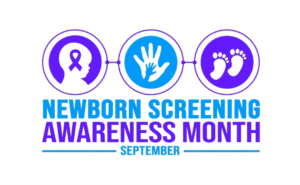Honoring Newborn Screening Awareness Month
How Pediatric Radiology Supports Early Care
Welcoming a newborn is a time of joy, wonder, and hope for the future. During these first precious days,one of the most important steps in protecting your baby’s health is the newborn screening process. These screenings, performed within the first 24 to 48 hours after delivery, check for more than 30 treatable conditions that may not be visible at birth. They provide crucial information to help parents and medical teams make timely decisions, preparing families to prevent or treat certain conditions before they cause serious health problems.
screening process. These screenings, performed within the first 24 to 48 hours after delivery, check for more than 30 treatable conditions that may not be visible at birth. They provide crucial information to help parents and medical teams make timely decisions, preparing families to prevent or treat certain conditions before they cause serious health problems.
What Are Newborn Screenings?
Newborn screenings are a group of simple, standard tests designed to detect rare but serious health conditions early in a baby’s life. These screenings can identify metabolic, hormonal, blood, and genetic disorders before symptoms appear. Most of these conditions, when caught early, can be managed effectively, preventing complications such as developmental delays, long-term disability, or even life threatening situations.
How Are the Screenings Conducted?
The process is quick and minimally invasive. Newborn screenings typically include:
- Heel prick (blood spot test): A few drops of blood are collected from your baby’s heel to check for certain conditions.
- Hearing test: Gentle sounds are played into the baby’s ears to screen for hearing loss.
- Pulse oximetry: A painless sensor measures oxygen levels in your baby’s blood, helping detect certain heart conditions.
These tests are done before your baby leaves the hospital, giving medical teams the opportunity to act early if needed.
Why Are Newborn Screenings So Important?
Early detection can be life-saving. Many of the conditions screened for do not show signs right away, but can quickly impact a baby’s health if left untreated. Identifying and treating these conditions early can:
- Prevent serious illness or complications
- Support healthy development
- Provide families with the knowledge and resources to manage care
Timely diagnosis often leads to better outcomes and greater peace of mind for parents.
The Role of Pediatric Radiology in Newborn Care
While newborn screenings primarily involve laboratory tests, pediatric radiology often plays a vital role in confirming or further investigating certain conditions. When a screening indicates the possibility of a structural, heart, or developmental concern, imaging may be the next step. Pediatric radiology offers safe and specialized imaging techniques—such as ultrasound, X-ray, or MRI—tailored for infants to provide detailed insights into your baby’s health. For example, radiology may help:
- Evaluate heart or lung conditions flagged during pulse oximetry
- Assess congenital abnormalities detected through initial screening
- Guide treatment plans and monitor progress
Pediatric radiologists are trained to work with the smallest patients, using methods designed to minimize radiation exposure and keep your baby as comfortable as possible.
Supporting Families from the Start
Newborn Screening Awareness Month reminds us how vital these early steps are in giving every child the best start in life. Screenings, combined with the expertise of pediatric radiology when needed, form a powerful partnership in detecting, diagnosing, and managing conditions that could otherwise go unnoticed.